Palestine
A public opinion war on Middle East politics is playing out this spring in new advertising campaigns on public buses and in newspapers.
It began when the American Muslims for Palestine (AMP) launched bus ads during the April Cherry Blossom Festival condemning U.S. aid to Israel because of that country’s continuing occupation of Palestinian territories.
Then on Monday, Pamela Geller’s American Freedom Defense Initiative countered by deploying 15-foot-long ads on 20 buses in the Washington, D.C., system that equate opposition to Israel’s policies with Nazism. One ad shows the grand mufti of Jerusalem meeting Hitler during World War II.
“The bus system is considered public space, so speech has First Amendment protections,” said Caroline Laurin, a spokeswoman for the Washington Metropolitan Area Transit Authority. “We have no grounds to refuse ads due to their content.”

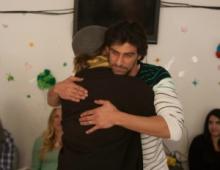
Having just gotten home from guiding another The Global Immersion Project Learning Community deep into the lives of the unheralded heroes in the Holy Land to learn from their often untold stories, I am processing emotions, thoughts, and reflections that will soon bud into a renewed set of practices at home and abroad. I have now been to Israel/Palestine quite a few times, and it would be easy to think the experience becomes mechanical or normal or whatever. Well, for me, that simply hasn’t been the case. We encourage our participants to enter the experience in the posture of a learner rather than a hero. I try to do the same, and in doing so, am continually convicted, challenged, and inspired by our remarkable friends and peacemakers embedded within this conflict.
Here are 7 learnings that have risen to the surface since landing back on home soil:

Secretary of State John Kerry brought his argument for a two-state Israeli-Palestinian peace to the annual AIPAC conference this week, and whatever else we might know, we know this: Many evangelical Christians didn’t like it.
Or at least that’s what we’re told by some Christian leaders and their political allies. Supporting Israel’s government by opposing compromise with the Palestinians is a permanent plank in American evangelical political thought. “God told Abraham that he would bless those who bless him and the nation of Israel,” the thinking goes, “and curse those that curse Israel.”
But could it be that the truth is more complicated?
What if the loudest evangelical voices don’t represent the complexity of our community? I raise these questions as an evangelical who is fully committed to supporting the struggle for security, dignity, and freedom for Israelis and Palestinians. And I’m not alone.

Moriel Rothman speaks candidly about his decision to not serve in the Israel Defense Forces.
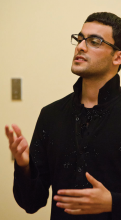
THE ULTIMATE BRAVERY might well be the courage to forgive one’s enemies and hold on to hope.
Nelson Mandela famously emerged from 27 years in prison as a reconciler and uniter, somehow free from bitterness and hatred. He was able to put into practice Jesus’ call to love our enemies—and thus became the father of the new South Africa.
Far from the upper echelons of power and fame, forgiving our enemies can be a difficult task, since “enemies,” by their very definition, aren’t easy to love. But in places of oppression, occupation, and routine violence, it’s even harder.
Take, for example, the story of a young man named Yousef Bashir. He grew up in the Gaza Strip, near an Israeli settlement known as Kfar Darom. In 2000, Palestinians rose up in protest against the Israeli occupation in what became known as the Second Intifada. In response, Israeli soldiers came to Yousef’s house and told his family to leave.
His father had dedicated his life to teaching Yousef and his brothers “how to coexist with the Israelis,” Yousef explained over lunch in Philadelphia early this winter, and he insisted on staying in their long-time family home. As a result, Yousef said, Israeli soldiers moved into the Bashir family’s house when he was 11 years old. They occupied the house until he was 15.
What a relief it would be to dwell in [faith] communities where we acknowledge our shadows in a healthy acceptance of ourselves as containers of all the opposites! It may prove beneficial to be forced to face, daily, the humiliating fact that some of us are no less violent than those whose policies we oppose.
—Walter Wink, Engaging the Powers
I AM A conscientious objector, and I am drawn to violence. My attraction to violence is both innate and learned. When something frightens me, my hands clench into fists. When something angers me, I want to inflict pain upon that thing. But a person cannot inflict pain upon a thing, so I seek out those whom I deem responsible for said thing and my desire to inflict pain upon a thing morphs into a desire to do violence to another person. Since I was a child, I have fantasized about using violence to stop what I see as bad and thereby become good.
It is from this point—from these fantasies of righteous violence—that I begin this essay on my journey to principled nonviolence and conscientious objection. This is a story of change and choice, but it is not a story of transformation: I am who I have always been.
In fall 2012, I spent three weeks in Israeli military prison for refusing to enlist in the Israel Defense Forces. (Every Israeli citizen, except for the ultra-Orthodox and Palestinian citizens of Israel, must serve in the military.) My sentence was brief, but the process that brought me to the prison’s gates took almost a decade.
EVERY SO often an extraordinary book appears with potential to bring change—or at least advance justice by mitigating nationalism or prejudice. Rabbi Michael Lerner’s Embracing Israel/Palestine: A Strategy to Heal and Transform the Middle East is such a book. The appeal is clear: Be both pro-Palestinian and pro-Israeli and pray for the best for each.
The book is a gut-wrencher as it describes the results of cyclical violence and reaction that fuels descent into paralyzing trauma and anger for both Arabs and Israelis.
Lerner, an advocate for Middle East justice and founder of Tikkun magazine, speaks truth about the human-made tragedy of the Israeli/Palestinian conflict. His transformative counsel about what people and nations can do to participate positively is desperately needed. Social justice advocates have been offered a candid and honest reprise of the tragic thinking and actions of oppressed people who should have known better than to visit the same on “the other.”
Lerner’s way toward peace is grounded in many years of living in and traveling to Israel/Palestine, loving the two protagonists equally, and constantly exploring his and others’ souls. In spite of the victimizing and traumatizing of both Jews and Arabs, he remains hopeful. Embracing makes for a compelling and even inspiring read. I devoured most of it in two sittings, captivated by Lerner’s vision.
How can we save 40,000 lives in under three minutes?
That question served as the provocative title of Israeli medic Eli Beer's TEDMED talk. Beer is the founder and president of Israel-based United Hatzalah (which is Hebrew for "rescue"), a rapid response team of 2,000 skilled volunteers — EMTs who range professionally from "expensive lawyers to people who sell fish or shoes," he said to CNN Health.
Beer answered his question this way, "The average response time of a traditional ambulance is 12 to 15 minutes — we reduce it to less than three minutes. Our response is the fastest in the world. We call our approach a lifesaving flash mob. On motorcycles, traffic doesn't stop us. Nothing does."
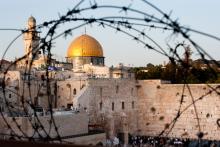
What do you do with critical information on intractable justice issues when reputation, methods, or prevailing propaganda make it difficult for people to believe the truth? How does one find ways to strengthen the fragile line between democracy and the lurking dark social disorder? Limiting or reversing anarchy in the U.S. and abroad may depend on finding ways to persuade and protect the common good.
A current question is in regard to the 20-year Oslo peace process (which was to be completed with separate States after 5 years). When it failed, its successor peace plans promised to bring flourishing democracy and a just peace that would hold back the winds of war and be good for Israelis as well as Palestinians.
The strategy of negotiations with prolonged periods of stalling has only widened the occupation and allowed Israel to strengthen its hold on Palestinian property. It has been conquest by a 1,000 cuts on people (1,500 Israelis and 15,000 Palestinians dead), as well as uprooted trees and bulldozed property. Less than 10 percent of 1967 war land area of Palestine is fully controlled by the Palestinian Authority. It is as though a volcanic cloud blocks the sun. Even with Secretary of State John Kerry’s vigorous efforts to diminish the rumblings and forestall an eruption, those who assure us there are signs of hope declare time is growing mercilessly short.
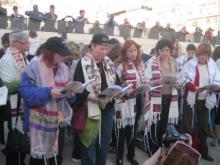
Where once it seemed that uncritical devotion to Israel was the norm for U.S Jews, that Zionism and Judaism were hand-in-glove, new research finds that’s not the case today — if it ever was.
The Pew Research Center’s newly released, comprehensive Portrait of Jewish Americans not only delved into myriad ways people identify as Jews, it also probed their emotional connection and their theological and political ideas about the Jewish state.
GEORGE MITCHELL, the former U.S. senator who famously brokered peace in Northern Ireland, knows the path to peace is unpredictable. “Until it happens,” he said, “you can’t predict with certainty. ... You can’t take ‘no’ for an answer. ... You just have to keep at it until peace is achieved.”
After five years of stalled Middle East peace talks, Secretary of State John Kerry lured Israeli and Palestinian negotiators back to the peace table in July. Sadly, my desk is littered with articles by naysayers who seem more than willing to “take ‘no’ for an answer” when it comes to peace in the Holy Land.
Naysayers point to the expansion of Jewish settlements and the political power of Israeli hawks, as well as the divisions in Palestinian society that convince them there is “no true partner for peace.” Certainly years of disappointments and failed negotiations offer ample cause for skepticism.
But I agree with Faisal Abbas, who suggests that cynicism is a lazy option we can’t afford. “Negotiations may succeed or fail to achieve peace,” he writes, “but the alternative (not having these negotiations) is guaranteed to fail.”
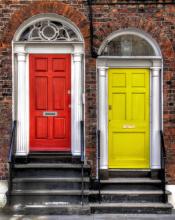
Our relationship to place is so conditioned by our life experiences. When I moved to North Cambridge, Mass., from the expansive West Coast, I got a lesson in the meaning of “near” and “far.” Walking around my new neighborhood, I greeted an old woman sitting in front of her house.
“Did you grow up around here?” I asked.
“Oh no,” she assured me, “I grew up way over on Sherman Street.” Sherman Street is about three blocks from where we were talking, but it is a different neighborhood. So in the language of her personal geography, Sherman Street is not “around here.”
When I traveled to Israel this summer with a group of seminary students from Andover Newton Theological School and Boston University School of Theology, what struck me most was another lesson of geography: If you live in a country the size of New Jersey, your sworn enemy might literally be your next door neighbor.

Upon my recent return from the Middle East (with The Global Immersion Project), I was struck more than ever before at our Western infatuation around military aggression, violence, and division. Not only are these the primary narratives we are fed through our major media outlets, they are the narratives we subconsciously embrace through the latest bestseller, box office hit, or video game. Violence, death, and division have become normative. We are becoming numb to the very things that we – as ambassadors of hope and reconciliation – are to turn from as Resurrection People. It is as though there is a stranglehold on our on our ability to see and participate in the stories of healing and new life.
As surprising as this may be, embedded in the midst of these conflicts are endless stories of hope that never make the latest headline or sound bite. And in the times I've followed Jesus INTO these places of conflict, I continue to encounter stories of peace and hope that embody the Gospel message, stories by real people, happening right now, in places usually known only for conflict, violence, and death.
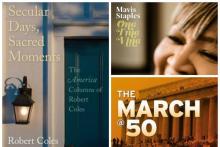
The Dream at 50
This August marks the 50th anniversary of the historic March on Washington for civil rights for African Americans. PBS will feature special broadcast and Web programming, including the premiere of the new documentary The March onTuesday, Aug. 27 (check local listings). pbs.org/black-culture/explore
The Miracle of Meaning
Secular Days, Sacred Moments: The America Columns of Robert Coles, edited by David D. Cooper, collects 31 short essays by the respected child psychiatrist and Pulitzer Prize-winning author. Whatever the topic, Coles offers thoughtful insights on civic life and moral purpose. Michigan State University Press
IN "SILENCE FOR GAZA,” Palestinian poet Mahmoud Darwish captures the contradictions of the coastal enclave, describing it alternately as “ugly, impoverished, miserable,” and “the most beautiful, the purest and richest among us.” Darwish’s antonyms evoke Gaza’s crushing conditions and resilient residents, exemplars of sumud, an Arabic word roughly translated as “steadfast perseverance”—a fundamental form of Palestinian resistance. Darwish’s poem also states that Gaza “did not believe that it was material for media. It did not prepare for cameras and did not put smiling paste on its face.” And yet every person, every story, every image of Gaza illustrates this persistent paradox of a land at once ugly and beautiful.
“I DON’T KNOW why they targeted us. No rockets were fired from our neighborhood,” says citrus farmer Yusuf Jilal Arafat, whose 5-year-old daughter Runan was killed when Israeli warplanes bombed their home. Arafat’s wife, four months pregnant, and their 8-year-old son were found alive in the rubble. His surviving children now suffer from frequent panic attacks at night. Many of Arafat’s trees were destroyed by the bombs, and the ground is covered with oranges now in various stages of decay. Rumors of contamination by Israeli weapons may hurt the sales of his crop, but he will still harvest. The family is living with Arafat’s father-in-law until they can rebuild.
Rebuilding under Israeli import restrictions is no simple task, so salvaging existing materials remains a vital practice—albeit risky, according to structural engineers. But ingenuity-by-necessity is constantly on display in Gaza, whether it’s recovering crushed stone from beneath ruined highways, straightening steel rebar from bombed-out buildings, or pulverizing concrete for reuse in new (but weaker) blocks.
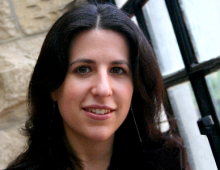
IN HER JEWISH school in Montreal, Ronit Avni learned the tragic history of her people. Her Canadian mother and Israeli father had met in the ’60s when her mother was living in Israel and working as a folk singer, often performing for Israeli troops. Her older sister was born in Tel Aviv, but the family settled back in Montreal in the mid-’70s before Ronit was born.
Not strictly religious but committed to the values of Judaism, Ronit couldn’t help but ask probing questions as she listened to the stories of the birth of the modern state of Israel in 1948. Am I hearing the whole story? How do Palestinian perspectives differ from what my educators and community leaders are teaching? How can we transform this situation from a zero-sum equation to one that respects the dignity and freedom of all?
Years later, having graduated with honors from Vassar College with a degree in political science after studying theater at a conservatory in Montreal, Ronit trained human rights advocates worldwide to produce videos as tools for public education and grassroots mobilizing.
By the time I met Ronit a few years ago, she had narrowed her worldwide focus to the Israeli-Palestinian conflict, where her heart was most deeply drawn. She is the founder and executive director of Just Vision, an organization dedicated to increasing media coverage and support for Palestinian and Israeli efforts to end the occupation and conflict without weapons of violence.
During the last several years, my engagement in the Holy Land has been significantly shaped by Ronit. Her film Encounter Point, about Israelis and Palestinians who have lost family members, land, or liberty to the conflict yet choose forgiveness and reconciliation rather than revenge, gave me hope that peace can emerge from pain.